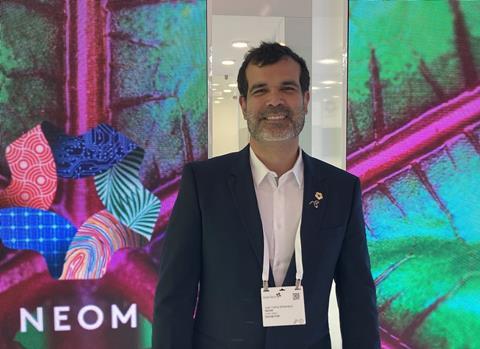Neom Food’s Dr Juan Carlos Motamayor says he is confident we can develop the solutions needed to grow crops in conditions of extreme heat and water scarcity and create a more sustainable world
The future of food is the future of mankind, according to Dr Juan Carlos Motamayor, executive director of Neom Food, speaking at the GreenTech exhibition in Amsterdam.

In large part, he said, the future will be shaped by how we produce, process and consume food in the age of climate change.
“Most modern agricultural practices were developed at a time when climate change was not the reality it is now,” he said. “Now, the agricultural model is making climate change worse, and climate change in turn makes our current food production model unsustainable. It’s a vicious circle that we urgently need to break. We must produce more with less. Less land. Less water. Particularly in arid conditions like in the Middle East.”
Neom is a region in the northwest of Saudi Arabia facing the sort of extreme climate that more and more countries are expected to face in the near future, making it ideal for testing future-focused methods of food production.
“At Neom Food, we’re a fast-growing, international community of innovators, entrepreneurs and scientists who are developing, testing and commercialising new ideas and new technologies to develop future-forward industries that tackle the key challenges humanity is facing today,” said Motamayor. “We’re fortunate that our region is a living laboratory and testbed, where we have the freedom to try out new approaches to living and working, including all aspects of the food chain – from production to consumption.”
The focus is to learn how to grow crops efficiently in desert conditions, using production systems best suited to extreme heat and water scarcity.
“We are currently piloting large-scale technological projects to test various combinations of technology that will lead to food self-sufficiency and mitigate climate change by reducing food miles,” explained Motamayor. “A crucial aspect we are addressing is the efficient use of water. Due to resource overuse and climate change, the gap between global water supply and demand is projected to reach 40 per cent by 2030.”
As such, Neom has excluded the use of natural aquifers, instead relying on desalinated water, but this of course adds to production costs.
“The challenges we face are daunting,” conceded Motamayor, “but they are not insurmountable. With creativity, collaboration and commitment, we can develop the solutions we need to grow crops under extreme heat and water scarcity, to adapt to and mitigate the impacts of climate change, and to create a more sustainable and equitable world. The future of our planet, and of all life on it, depends on our actions today. Let’s rise to this challenge. Together, let’s grow tomorrow’s agricultural system.”



